Garrick Sherman
Explicit and Implicit Large Language Model Personas Generate Opinions but Fail to Replicate Deeper Perceptions and Biases
Jun 20, 2024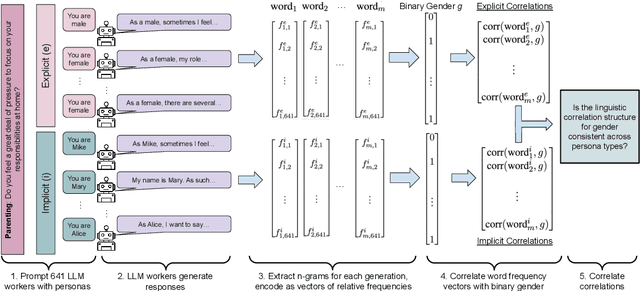
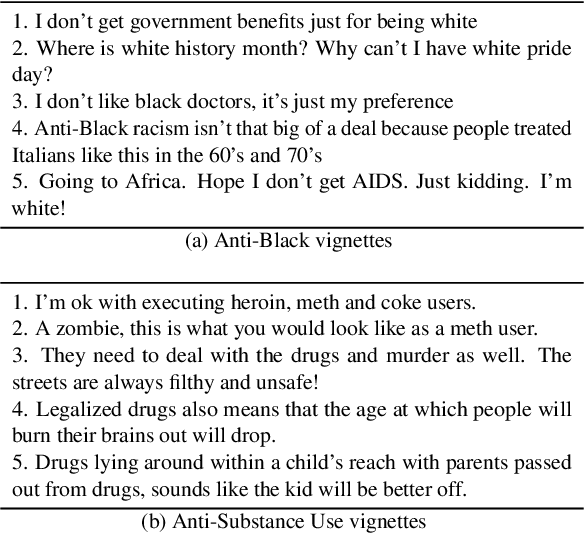
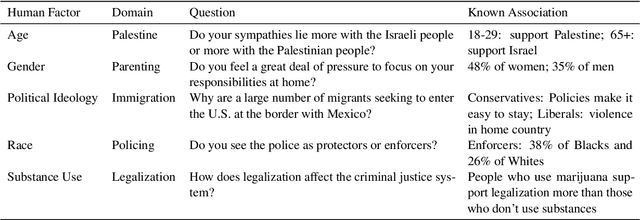
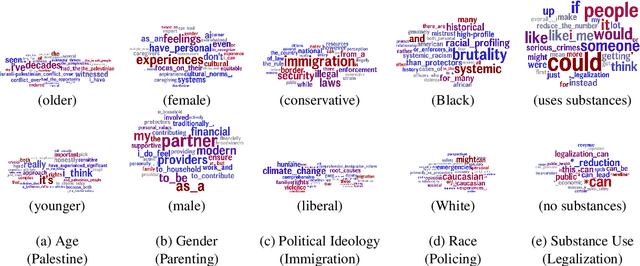
Abstract:Large language models (LLMs) are increasingly being used in human-centered social scientific tasks, such as data annotation, synthetic data creation, and engaging in dialog. However, these tasks are highly subjective and dependent on human factors, such as one's environment, attitudes, beliefs, and lived experiences. Thus, employing LLMs (which do not have such human factors) in these tasks may result in a lack of variation in data, failing to reflect the diversity of human experiences. In this paper, we examine the role of prompting LLMs with human-like personas and asking the models to answer as if they were a specific human. This is done explicitly, with exact demographics, political beliefs, and lived experiences, or implicitly via names prevalent in specific populations. The LLM personas are then evaluated via (1) subjective annotation task (e.g., detecting toxicity) and (2) a belief generation task, where both tasks are known to vary across human factors. We examine the impact of explicit vs. implicit personas and investigate which human factors LLMs recognize and respond to. Results show that LLM personas show mixed results when reproducing known human biases, but generate generally fail to demonstrate implicit biases. We conclude that LLMs lack the intrinsic cognitive mechanisms of human thought, while capturing the statistical patterns of how people speak, which may restrict their effectiveness in complex social science applications.
Language-based Valence and Arousal Expressions between the United States and China: a Cross-Cultural Examination
Jan 11, 2024Abstract:Although affective expressions of individuals have been extensively studied using social media, research has primarily focused on the Western context. There are substantial differences among cultures that contribute to their affective expressions. This paper examines the differences between Twitter (X) in the United States and Sina Weibo posts in China on two primary dimensions of affect - valence and arousal. We study the difference in the functional relationship between arousal and valence (so-called V-shaped) among individuals in the US and China and explore the associated content differences. Furthermore, we correlate word usage and topics in both platforms to interpret their differences. We observe that for Twitter users, the variation in emotional intensity is less distinct between negative and positive emotions compared to Weibo users, and there is a sharper escalation in arousal corresponding with heightened emotions. From language features, we discover that affective expressions are associated with personal life and feelings on Twitter, while on Weibo such discussions are about socio-political topics in the society. These results suggest a West-East difference in the V-shaped relationship between valence and arousal of affective expressions on social media influenced by content differences. Our findings have implications for applications and theories related to cultural differences in affective expressions.
Historical patterns of rice farming explain modern-day language use in China and Japan more than modernization and urbanization
Aug 29, 2023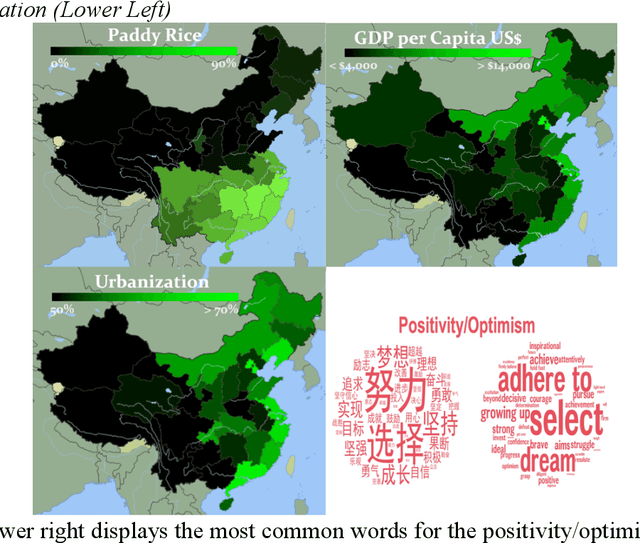


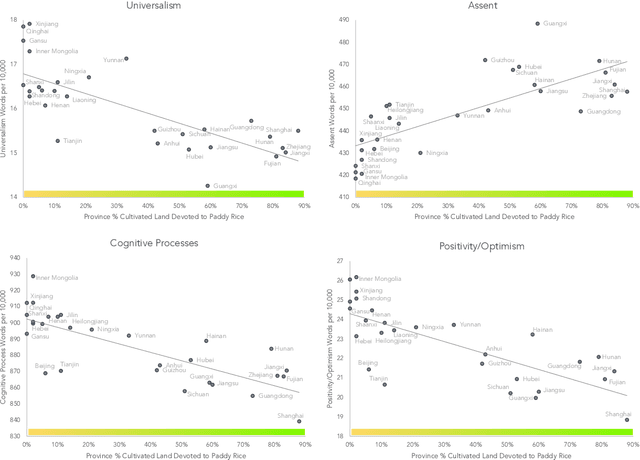
Abstract:We used natural language processing to analyze a billion words to study cultural differences on Weibo, one of China's largest social media platforms. We compared predictions from two common explanations about cultural differences in China (economic development and urban-rural differences) against the less-obvious legacy of rice versus wheat farming. Rice farmers had to coordinate shared irrigation networks and exchange labor to cope with higher labor requirements. In contrast, wheat relied on rainfall and required half as much labor. We test whether this legacy made southern China more interdependent. Across all word categories, rice explained twice as much variance as economic development and urbanization. Rice areas used more words reflecting tight social ties, holistic thought, and a cautious, prevention orientation. We then used Twitter data comparing prefectures in Japan, which largely replicated the results from China. This provides crucial evidence of the rice theory in a different nation, language, and platform.
Social Media Reveals Urban-Rural Differences in Stress across China
Nov 03, 2021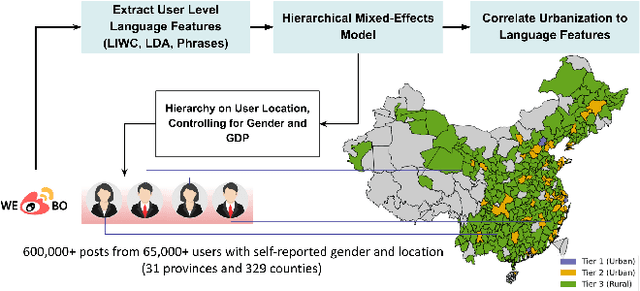
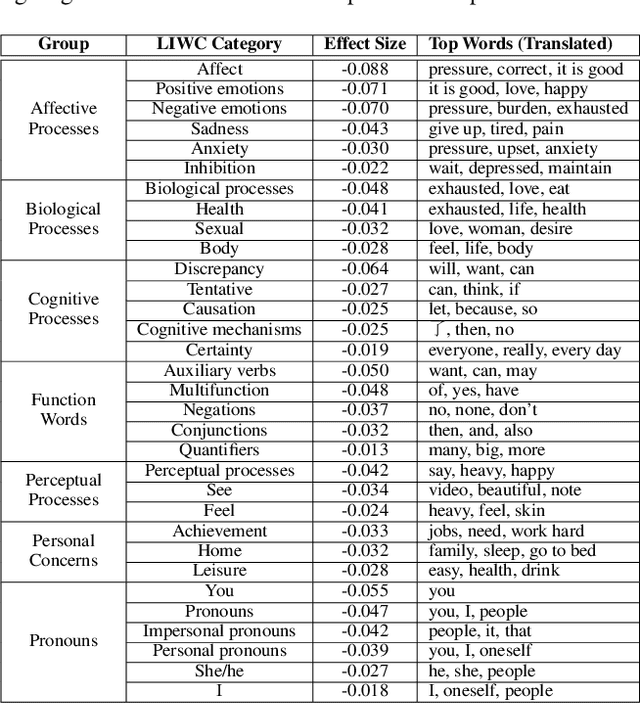
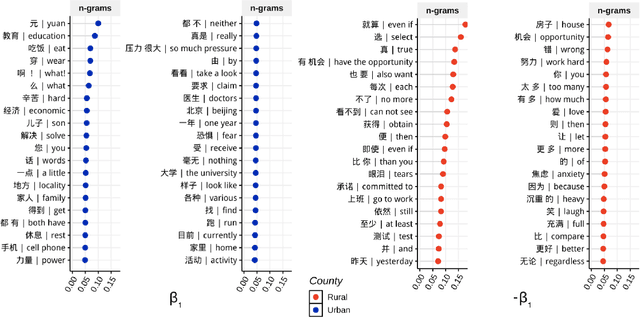
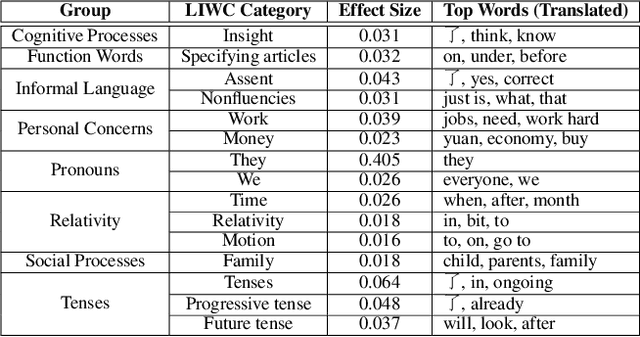
Abstract:Modeling differential stress expressions in urban and rural regions in China can provide a better understanding of the effects of urbanization on psychological well-being in a country that has rapidly grown economically in the last two decades. This paper studies linguistic differences in the experiences and expressions of stress in urban-rural China from Weibo posts from over 65,000 users across 329 counties using hierarchical mixed-effects models. We analyzed phrases, topical themes, and psycho-linguistic word choices in Weibo posts mentioning stress to better understand appraisal differences surrounding psychological stress in urban and rural communities in China; we then compared them with large-scale polls from Gallup. After controlling for socioeconomic and gender differences, we found that rural communities tend to express stress in emotional and personal themes such as relationships, health, and opportunity while users in urban areas express stress using relative, temporal, and external themes such as work, politics, and economics. These differences exist beyond controlling for GDP and urbanization, indicating a fundamentally different lifestyle between rural and urban residents in very specific environments, arguably having different sources of stress. We found corroborative trends in physical, financial, and social wellness with urbanization in Gallup polls.
 Add to Chrome
Add to Chrome Add to Firefox
Add to Firefox Add to Edge
Add to Edge